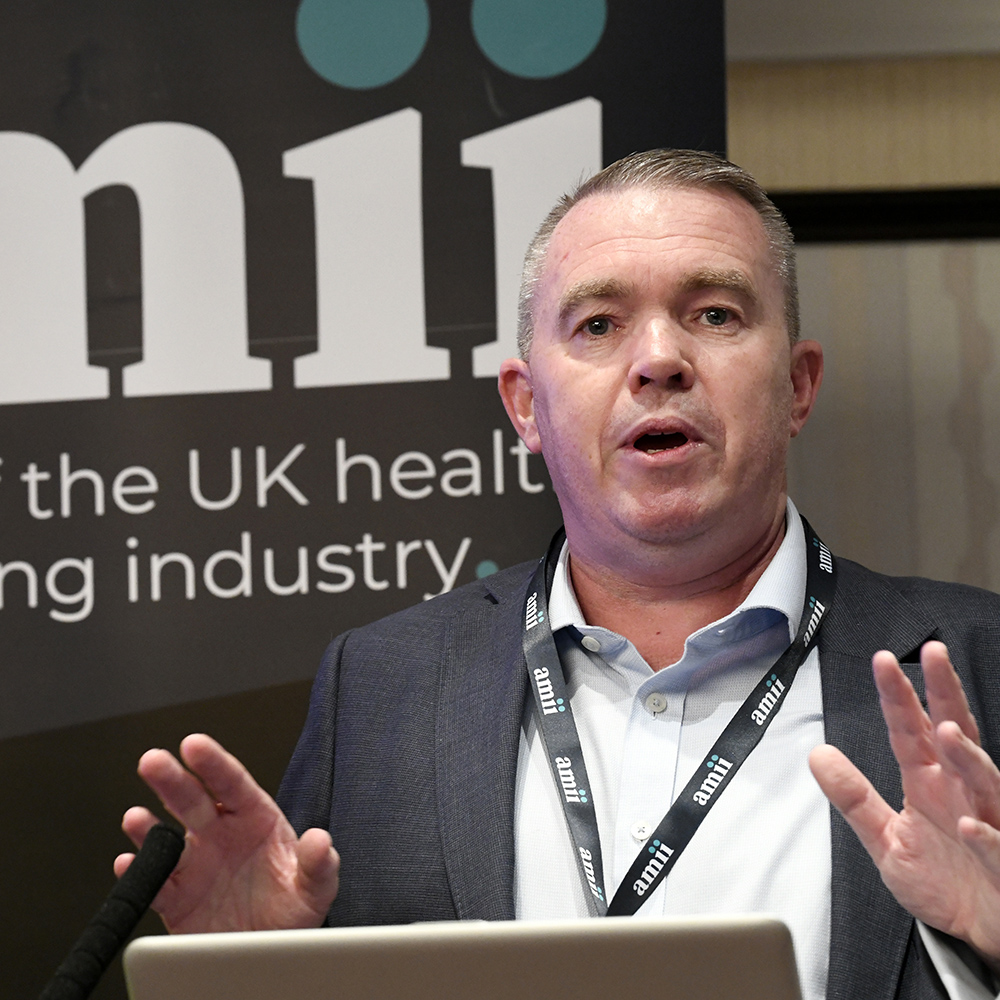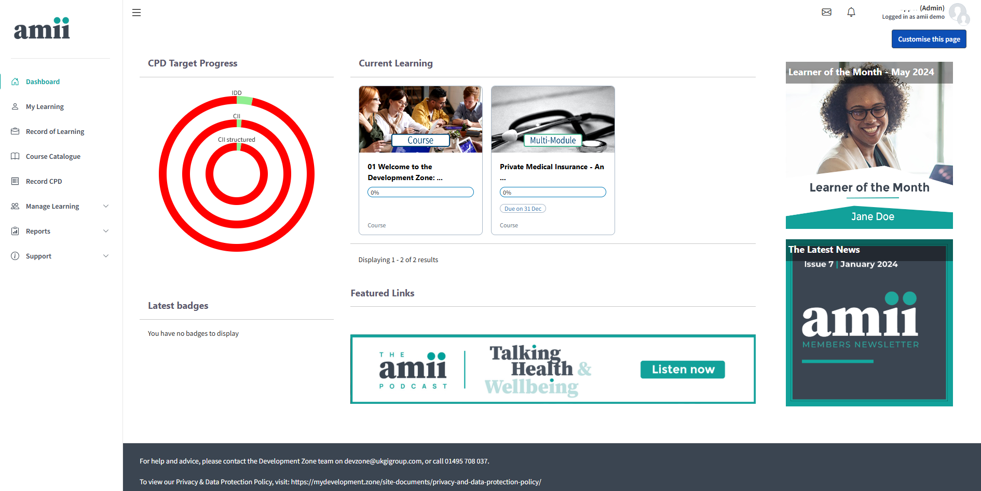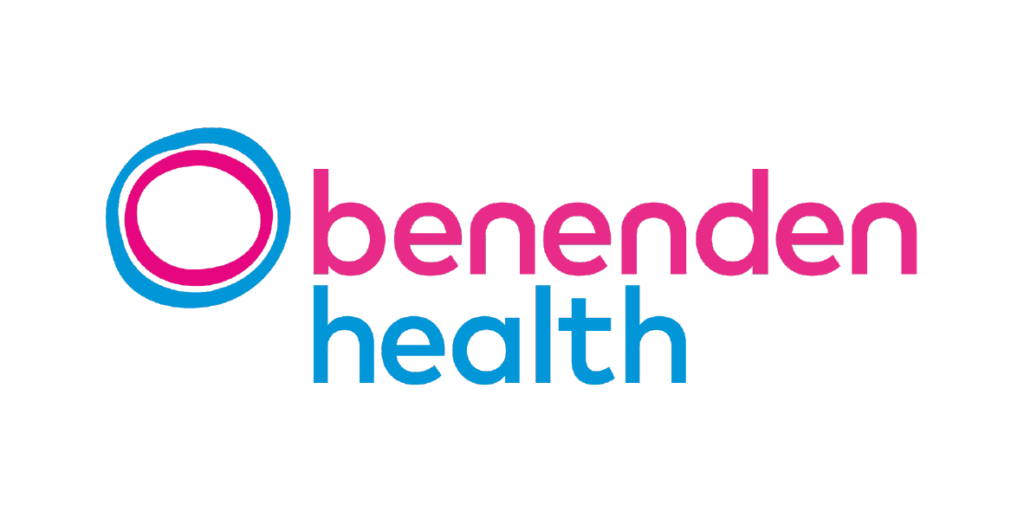Issue 11 | May 2025


Hello
And welcome.
Dave Middleton, Executive Chair, amii
Welcome to the latest amii members’ newsletter.
I trust you are all in good health and your business is flourishing.
I am delighted to present our latest amii newsletter, featuring a comprehensive collection of insights and updates from across our community. This edition includes a thought-provoking article from Yasmin Greenaway exploring the transformative impact of AI on our sector. It also provides detailed information about our expanding training academy and an exclusive link to the compelling trailer presented by Liam Kennedy at our recent summit.
You will also find a valuable contribution from Benenden examining the implications of increased National Insurance contributions and the strategic opportunities this development presents. For the members who could not join us on the day, this newsletter includes a thorough summary of our AGM proceedings and financial reporting outcomes.
Join me in welcoming Anders Lewis and Lucy Pearce to our Executive Committee. We look forward to collaborating with them and drawing upon their considerable expertise, which you can learn more about in this newsletter. Anders and Lucy succeed our long-serving committee members Alan Mulligan and Guy Jones, to whom we extend our heartfelt gratitude, alongside our outgoing Vice Chair, Claire Ginnelly, for their exceptional dedication and invaluable contributions to our association over recent years.
The feedback from our spring summit so far has been overwhelmingly positive, and we thank all those who participated in what proved to be an engaging and productive event. We will be uploading the speaker presentations to our exclusive member-only area shortly, but in the meantime, please be sure to provide your feedback on the spring summit here.
Please also watch for a vital survey in the coming weeks seeking your perspectives on our future events and initiatives. Your input is essential as we strive to ensure our member offerings continue to meet your needs and expectations.
I hope you have an enjoyable summer, and I eagerly anticipate reconnecting with you at our November summit.
Newsletter Contents.

The AI inflection point:
How policyholder expectations, clinical practice and system design are evolving together.
Yasmin Greenaway FRSA, Founder and CEO, Dermie.AI
At the recent amii Health & Wellbeing Summit, I spoke about the state of AI in healthcare and what it truly means to “go live” in a high-stakes, high-regulation domain. We’re standing at an inflection point; AI is no longer an abstract future technology. It’s here, being deployed, tested and crucially – expected by end users.
There’s a powerful evolution underway in the expectations of everyday people. Companies like Neko Health are normalising the idea that early diagnostics can be fast, comprehensive and even enjoyable. When people experience this type of preventive, tech-first care, the Overton window of what “normal” healthcare looks like, starts to shift. As consumers grow used to instant, AI-enabled answers in other areas of life, their expectations for speed, accessibility and personalisation in healthcare will continue to rise. Health is no longer a “when-you-need-it” service; it’s becoming an ‘always-on’ ecosystem, and organisations that don’t adapt risk becoming obsolete. For insurers and health providers, this requires a recalibration of services offerings and the mindset that underpins them.
In this changing landscape, trust becomes key. Despite impressive technical progress, AI should not yet operate in complete isolation in healthcare; systems that blend human expertise with algorithmic efficiency currently offer the most safety-focused outcomes. Human-in-the-loop design enhances user trust, supports clinician validation, and prevents inappropriate over-reliance on machine outputs. Importantly, it reassures both users and professionals that AI is a tool for partnership, not replacement. This position is not static however, and we cannot ignore the fact that systems will likely evolve to become autonomous where appropriate; for example, scaleup Skin Analytics has built up a rigorous evidence base to support standalone AI functionality. Their commitment to generating robust clinical data allowed them to achieve Class III MDR certification – a powerful validation, but also a more resource-intensive journey that reflects a different level of product maturity and regulatory strategy.

In designing AI systems for healthcare, we must ask not only “can it work?” but “can it work with people, and how?”. Tools that support shared decision-making, prompt escalation, or clarify uncertainty with human follow-through represent the best of what AI in health can offer. We’ve seen this in practice: AI triage systems that return differential suggestions rather than definitive answers (Healthily, Dermie.AI), are already helping guide patients toward the right level of care, while still respecting clinical judgement.
Piloting these tools in the real world reveals another important truth: AI pilots can fail not because the technology doesn’t work, but because the value proposition isn’t clearly defined or measured. During the Summit, I spoke about two pilot case studies: one with a major insurer and another with a private healthcare provider, where the difference in successful versus unsuccessful outcome came down to integration, impact, and clear KPIs. The lesson is clear: successful pilots are designed around a clear ROI logic. Are we reducing unnecessary appointments? Are users engaging as predicted? Clear, hypothesis-driven testing enables evidence-based scaling. AI doesn’t just need a clinical trial framework, it needs a commercial one too.
As we look forward, one of the most fascinating and (and potentially concerning) trends I’ve observed is the rise of LLMs as informal mental health companions. People are turning to AI for therapeutic interaction, often without comprehending the risks. This trend reflects the immense unmet demand in mental health services, but also raises difficult ethical and practical questions. These systems do not understand emotional nuance, are not tuned for trauma-sensitive responses, and can give dangerously misleading advice if prompted incorrectly. While users may experience short-term relief (as with journaling) – unlike a journal AI responds, and the user may assign it more credibility than is warranted. This highlights a deeper issue: education.
In an AI-augmented world, user skill becomes a key determinant of output quality. Using AI effectively requires active framing, prompting, and interpretive skill. In this context, the variance in output becomes unpredictable – two people asking the same question may receive vastly different responses depending on how they ask. This can be especially dangerous in health contexts, where misunderstanding can have serious consequences. We risk introducing new types of inequality: not just between those with and without access to care, but between those who know how to use AI effectively and those who don’t. Users and even clinicians may defer to outputs they don’t fully understand, especially when presented with confident-sounding results. We must foster critical AI literacy, both in the public and among professionals, to avoid inappropriate trust or blind adoption.
Concurrently, three dominant segments are emerging in the AI healthcare landscape, each with distinct capabilities and impact areas. First, tools designed to save time: ambient scribes and workflow tools that reduce administrative load; UK startups like Tortus.AI are leading in this space. Second, tools that increase capacity: agentic systems that perform multi-step tasks like appointment booking, claims processing (for example, Scottish Widows recently partnered with Sprout.ai) or early diagnostics. And third, tools to manage demand: triage systems like Healthily and Dermie.AI, which guide people toward appropriate care pathways and reduce system strain. These segments are shaping investment decisions, regulatory priorities, and end-user adoption pathways.
There is justified concern across the industry about international companies rolling out AI products in the UK simply because our regulatory frameworks may be more lenient than their home markets – this cannot be the foundation of our innovation ecosystem. At the same time, the UK has a chance to model what a balanced regulatory environment looks like – one that protects patients and policyholders, supports innovation, and fosters local development. This is where we have a unique opportunity. With one of the highest densities of world-class universities, our academic ecosystem is more than capable of building the next generation of health AI tools (after all, we did incubate DeepMind). The question is whether we will create the funding and regulatory environment to match. With initiatives like the AI Opportunities Action Plan and a pledged £500M for AI infrastructure, the intent is there. What’s needed now is execution and a commitment to cultivating a home-grown ecosystem that puts safety and innovation on equal footing.
AI in health is not just a technical story – it’s a cultural, economic, and regulatory one. It intersects with how people think about their bodies, their time, and their care. We must build systems that are safe, explainable and equitable, while acknowledging that the consumer is already moving forward. For those building or adopting AI in health, the charge is clear: define your ROI, include the human, respect the complexity – and don’t get left behind by a policyholder who’s already seen what’s possible.
Have you registered to join the for Members Only section of our website?
The for Members Only section of our site provides a wealth of content for members, as well as access to all the benefits that being a member of amii provides. If you haven’t done so already, please do register to take advantage of everything your membership offers. You can do so by following the link below.

amii plans comprehensive training academy to transform professional development in UK PMI.
Liam Kennedy – amii Executive Committee & Director of Key Accounts at Vitality
amii is delighted to share our plans for launching a groundbreaking Training Academy, a direct response to your overwhelming feedback that identified training and development as the top priority for 2025/26. This exciting initiative, championed by Executive Committee member Liam Kennedy from Vitality, represents a significant step forward in elevating professional standards across the UK Private Medical Insurance sector.
The development of our planned Training Academy stems from a fundamental challenge facing our industry: how do we effectively support engaged professionals working in demanding, diverse roles whilst accommodating different competency levels and learning preferences? With 2025 marking an accelerated drive for higher professional standards in the UK PMI market, amii recognised the urgent need for a comprehensive solution that serves both individual career development and broader business objectives.
The statistics speak volumes about the importance of this initiative. According to LinkedIn Learning research, 90% of organisations are concerned about employee retention, with professional development opportunities ranking as the number one retention strategy. Our forthcoming Training Academy will directly address this critical business need whilst simultaneously raising industry standards.
Your feedback made it clear that members wanted comprehensive training resources, but the benefits will extend far beyond member satisfaction. Our Training Academy is being designed to create common industry professional standards, drive better customer service and outcomes, reduce business risks, and minimise the chance of consumer harm. The platform will ensure compliance with Insurance Distribution Directive (IDD) and Treating Customers Fairly requirements whilst supporting established qualification routes such as IF7.
Perhaps most importantly, the academy will help attract and retain talent in our competitive marketplace. By providing clear learning pathways and professional development opportunities, we’re planning to help member organisations build stronger, more knowledgeable teams that can deliver exceptional service to their clients.
Stage 1 of our curriculum development will cover the essential foundations every PMI professional needs. The programme will begin with a thorough introduction to UK Private Medical Insurance, exploring the purpose of PMI and the key differences between state and private healthcare sectors. Students will understand how these systems interface and how NHS development has influenced UK PMI growth.
The academy will provide a comprehensive overview of the PMI market, including distribution channels and how PMI coexists alongside other health insurance products such as cash plans and wellbeing programmes. We’re also planning to include crucial information about tax implications across different products, ensuring learners understand the complete landscape.
Our curriculum will examine UK PMI within the broader healthcare context, comparing major healthcare systems both domestically and internationally, including models from the United States and Europe. This global perspective will help professionals understand best practices and emerging trends that could influence the UK market.

The training will go beyond theory to cover practical elements including product design for both group and individual PMI products, extent of cover, hospital lists, general exclusions, and the nuances between consumer-style products and employer group schemes. Learners will master the principles of underwriting and administration, understanding how insurers assess risk from pricing perspectives and how claims influence insurer attitudes towards risk.
Crucially, the academy will address the role of UK intermediaries within the complex framework of law, insurance premium tax, and regulation, ensuring professionals can navigate this challenging environment with confidence.
Our Training Academy is being built around ten aspirational learning pillars, progressing from understanding the UK healthcare PMI market through to applying legal and regulatory principles including Consumer Duty. These pillars will ensure comprehensive coverage of essential competencies whilst providing clear progression pathways for learners at different career stages.
The Training Academy will feature a sophisticated online platform with CPD tracking capabilities, progress monitoring, comprehensive course catalogues, and integrated learning management systems. The user-friendly interface will support modern e-learning approaches including multi-module courses, learner recognition programmes, and seamless integration with amii’s broader educational ecosystem.
This comprehensive training initiative will position amii and our members at the forefront of professional development in the UK PMI sector, directly addressing industry needs whilst elevating standards across the entire marketplace. We’re excited to finalise these plans and look forward to supporting your professional development journey once the academy launches. In the meantime, you can click to watch the Training Academy trailer below.
A review of the AGM
And the future direction of amii.
Chair
Dave Middleton
Vice Chair
Vacant
Treasurer
Paul Swanson
General Secretary
Tina Jennings
Corporate
Karen Woodley
The Exeter
Corporate
Robert Bain
Bupa
Corporate
David Hughes
Aviva
Corporate
Liam Kennedy
Vitality
Corporate
Paul Molton
AXA Healthcare
Intermediary
Isaac Feiner
Lifepoint Healthcare
Intermediary
Lucy Pearce
Brown & Brown Health and EB
Intermediary
Anders Lewis
Gallagher Benefit Services UK
Intermediary
Ian Sawyer
Howden Life & Health
Intermediary
Wayne Pontin
The Sante
Group
Where We Stand Today
We continue to grow stronger with 144 current members (116 Intermediary and 28 Corporate) generating £217k in fees. We’ve maintained consistent communication through quarterly newsletters, delivered 11 podcasts and 13 webinars, secured regular coverage in industry publications four times monthly, and maintained an active weekly social media presence.
We continue to work on expanding our technology offerings with enhanced website content and sign-up. Our soon-to-be-launched training resources will complement this, and we will continue to work on developing the comparison tool. We’ve also strengthened our industry partnerships with BIBA, Laing Buisson, GRiD, GAIN, PHIN, and the Protect Association while successfully delivering two well-received summits alongside prominent industry publications.
Your Priorities Are Our Priorities
Thank you to everyone who participated in providing feedback at our last Summit. It has been instrumental in shaping our strategic direction. The top themes that emerged include training and education, which topped your wish list, with a strong demand for professional development opportunities, compliance support, and enhanced training provision. Communication and technology were also featured prominently, alongside calls for greater focus on AI in healthcare, neurodiversity awareness, and improved comparison tools.
For our 2025 summits, you’ve asked for more inspirational speakers, enhanced case studies, and a deeper exploration of neurodiversity and AI applications. There’s also strong interest in mental health content, preventative interventions, and more opportunities for advisers to challenge insurers directly. We delivered some of this for the Spring Summit and plan to provide the rest during our Autumn Summit, so be sure to sign up when registration opens!
Our 2025/26 Objectives: Delivering What You Want
We’re responding to your feedback with concrete action plans across five key areas:
Membership Growth
We’re targeting 10% revenue growth while expanding our Corporate Wellbeing membership base and conducting a comprehensive constitution review to ensure we’re fit for the future.
Enhanced Communications
Maintaining quarterly newsletters and monthly webinars (with quarterly compliance-focused sessions), while increasing our podcast frequency to every six weeks and continuing our strong industry press presence.
Summit Excellence
We’re committed to increasing attendance and exploring venue changes, including a potential London summit in 2026. A special summit dinner is planned for 2026, and we’ll be surveying members in spring to shape our post-2025 summit strategy.
Technology Innovation
Exciting developments include launching our training academy, developing the benefits comparison tool further, improving website functionality, and creating a dedicated member community platform for enhanced networking and collaboration.
Strategic Partnerships
We’ll maintain our valuable existing relationships while developing our partnership with REBA, strengthening our lobbying capabilities, and investing in research initiatives that benefit the entire sector.
Looking Forward Together
These objectives directly reflect the priorities you’ve shared with us. From enhanced training resources to better technology tools, from more engaging summit content to stronger industry advocacy – we’re committed to delivering the value and support you need to thrive in an evolving marketplace.
We’ll keep you updated on our progress throughout 2025/26 and continue seeking your input to ensure amii remains the valuable, member-focused organisation you deserve.
Our executive committee.
amii welcomes two new industry leaders to its Executive Committee.
We are delighted to confirm two new appointments to our Executive Committee – Lucy Pearce, Commercial Director at Brown & Brown Health and Employee Benefits, and Anders Lewis, Corporate Consulting Team Lead at Gallagher.
Following the departure of long-serving members Claire Ginnelly, a freelance Health and Wellbeing Professional, Guy Jones, Director at Berwick Devoil Healthcare Limited, and Alan Mulligan, Client Director at Partners&, Lucy and Anders have joined amii’s Executive Committee to support amii’s mission in promoting excellence and best practices across the healthcare insurance sector.
The committee, which comprises experienced leaders with diverse expertise across the healthcare industry, plays an important role in setting amii’s strategic direction, developing member services, and driving industry-wide initiatives to enhance healthcare provision across the UK.

Lucy Pearce, Commercial Director at Brown & Brown Health
Lucy has almost 20 years industry experience and joined the board of Directors at advo in 2020 and became a shareholding Director in 2023. She joined Premier Choice Group (Now Brown & Brown Health and Employee Benefits) as Commercial Director following the acquisition of advo group in July 2024.
Her current remit includes insurer negotiation and relationships, management of AR’s associated with the Brown & Brown business and strategic oversight of the cross-referral program between General Insurance and Health and Employee Benefits.
She is passionate about the industry and regularly partakes in round table discussions and insurer advisory panels designed to discuss and shape the future of products and services.

Anders Lewis, Corporate Consulting Team Lead at Gallagher.
Anders started his career in 2001 at a small independent intermediary, United Medical Services Ltd leading the SME and Retail teams.
Through two acquisition’s (Oval Group in 2008 and Gallagher in 2014) he continued to work mainly in the SME healthcare sectors, focussing on building long standing relationships with key clients and driving a white glove service USP which still serves him well today.
In 2018 he joined Benefex to build large corporate and client technology experience, then moving onto Brunel Employee Benefits as Managing Director in 2019. Most recently he re-joined Gallagher in 2022, and currently leads a multidisciplinary team across Large Corporate Healthcare, Risk, DC Pension and Client Technology.
Dave Middleton, executive chair of amii, said: “I want to thank Claire, Guy and Alan for the tremendous impact they’ve had on amii throughout their time with us. They’ve helped shape who we are today, and their contributions to our strategic initiatives and member services have been outstanding.
“I am thrilled to have Lucy and Anders joining our Executive Committee, whose combined 40+ years of industry expertise will no doubt be extremely useful as we continue to support our members and advance the healthcare insurance sector.”

amii financial review 2024
Strong growth continues.
Paul Swanson, Treasurer of amii & Divisional Director at Howden Employee Benefits & Wellbeing
Corporate membership has been particularly strong, jumping 56.25% from 16 to 25 members over three calendar years. Whilst intermediary numbers remained steady at 118, this stability demonstrates amii’s continued relevance in a changing market.
Total expenditure rose to £145,893, representing a 43.53% increase since 2022. However, this investment targets member benefits directly. Key spending areas include £13,000 on compliance and technology improvements, plus £10,000 on enhanced meetings and summits.
Operating profit for 2024 was £34,329, down from previous years but still healthy given the strategic investments made.
Income growth is expected to continue into 2025. The Association has invested in an improved website, a clearer marketing strategy, and an expanded training academy. Despite temporary technology challenges delaying invoice distribution, amii’s financial position remains strong, supported by loyal intermediary and corporate members who ensure the organisation’s continued success.

Rethinking employee healthcare.
A strategic opportunity for advisers in times of economic pressure.
The recent National Insurance hikes have placed UK businesses under unprecedented financial strain. Yet within this challenge lies an opportunity for intermediaries to demonstrate genuine value by challenging conventional thinking around employee benefits. Rather than viewing healthcare provision as another expense to cut, forward-thinking advisers are repositioning it as a strategic solution that addresses multiple business pressures simultaneously.
The landscape has fundamentally shifted. Benenden Health found that nearly a quarter (24%) of UK adults are more likely to consider private healthcare options due to the current state of the NHS. Compared with findings from Elevate that show over half (56%) of UK employees are more likely to accept a job with an employer offering long-term health support, workplace provisions have never been more deciding. For advisers, this represents a chance to move beyond traditional insurance products and offer genuinely transformative workplace solutions.

The traditional approach of recommending comprehensive private medical insurance may no longer serve clients effectively. Instead, consider how targeted healthcare interventions can deliver measurable returns on investment. When employees access treatment quickly, businesses see reduced absenteeism and maintained productivity. When staff feel genuinely supported, retention improves and recruitment becomes easier. These aren’t soft benefits—they’re quantifiable business advantages that can offset National Insurance increases.
The key is helping clients understand that healthcare provision isn’t about replacing the NHS wholesale, but strategically filling the gaps that matter most to their workforce and operations.
Challenge your clients to think differently. Rather than expensive comprehensive cover, consider solutions that target specific pain points: health cash plans that ease the burden of everyday healthcare costs, private GP access that prevents minor issues becoming major problems, or mental health support that addresses the root causes of workplace stress and absence. These targeted approaches often deliver better outcomes at lower costs than traditional PMI, whilst giving businesses the flexibility to scale provision according to their financial constraints.
For intermediaries, this economic pressure creates a unique positioning opportunity. While competitors retreat or offer generic cost-cutting advice, you can demonstrate sophisticated understanding of how strategic healthcare provision can improve a business’s financial position. You’re not just selling insurance—you’re offering solutions to talent retention, productivity challenges, and competitive positioning.
The businesses that emerge strongest from current economic pressures will be those that invested wisely in their workforce when others were simply cutting costs. Position yourself as the adviser who understands this distinction.
